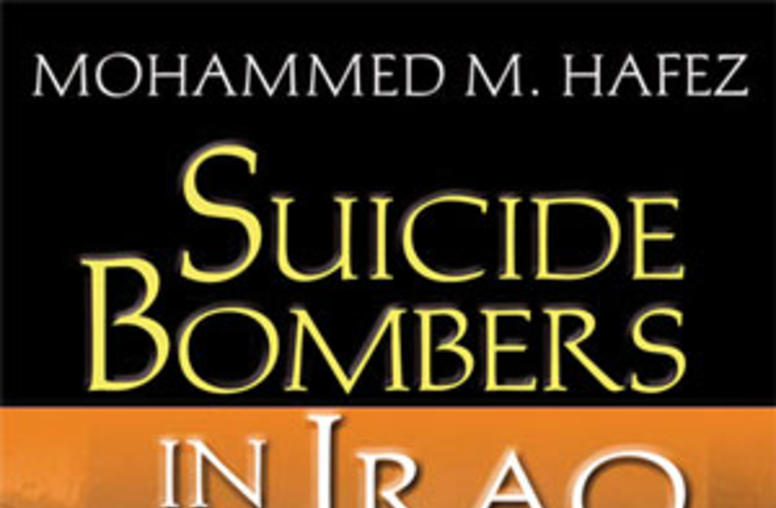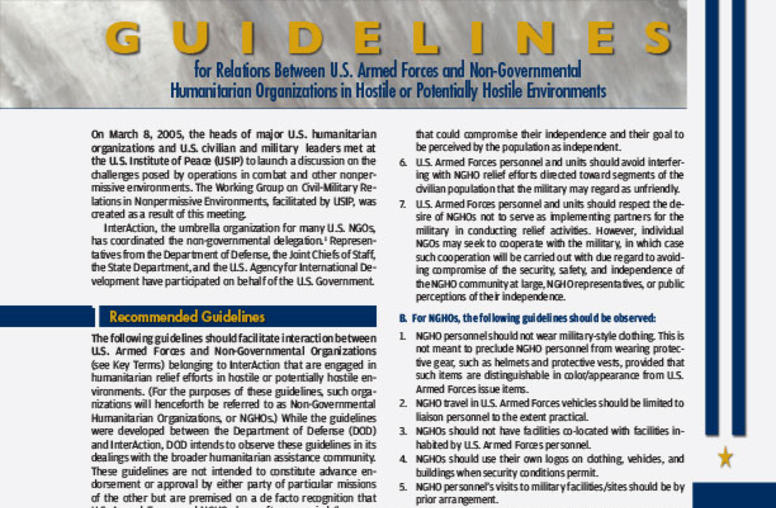Publications
Articles, publications, books, tools and multimedia features from the U.S. Institute of Peace provide the latest news, analysis, research findings, practitioner guides and reports, all related to the conflict zones and issues that are at the center of the Institute’s work to prevent and reduce violent conflict.

Suicide Bombers in Iraq
Author Mohammed Hafez examines the history of suicide bombing in Iraq, theoretical perspectives on suicide bombing, the varied factions that comprise the insurgency and the ideology and theology of martyrdom supporting suicide bombers in his new book Suicide Bombers in Iraq.
Suicide Bombers in Iraq
USIP grantee Mohammed Hafez briefed staff on the House Foreign Affairs Committee and the Senate Foreign Relations Committee on his recently USIP-published book Suicide Bombers in Iraq: The Strategy and Ideology of Martyrdom. Hafez is a visiting professor at the University of Missouri, Kansas City.
Healing and Reintegrating the Victims of Congo’s War
Child soldiers and women are among the most vulnerable victims of Congo’s war. Attending to their needs for reintegration, counseling, and medical attention are critical components for consolidating peace.
Rebuilding Civil Society in Afghanistan: Fragile Progress and Formidable Obstacles
Nearly six years after the U.S.-led invasion of Afghanistan, efforts to develop civil society are showing tentative signs of progress. The effectiveness of civil society in influencing development in the provinces remains low, and rising insecurity in many regions threatens the future prospects of the nascent Afghan civil society.
Developing and Managing Congo’s Natural Resources
The Democratic Republic of Congo (DRC) is among the most mineral-rich countries in Africa. During the war, those natural resources fueled the conflict, and provided illegal sources of wealth for some. Now, as the DRC undertakes the rebuilding of its economy, the management of natural resources serves as a key component in its development strategy.
No Silver Bullets for Afghanistan’s Drug Crisis
Afghanistan supplies more than 90 percent of the world’s opium. Despite concerted efforts to tackle the drug problem in Afghanistan, the industry continues to grow at an alarming rate, particularly in the south, where reconstruction efforts lag amidst poor security.

Guidelines for Relations Between US Armed Forces and NGHOs in Hostile or Potentially Hostile Environments
Developed in concert with the Department of Defense and Interaction (the umbrella organization for major American humanitarian non-governmental organizations), these guidelines address how the US military and US non-governmental organizations should behave towards each other in non-permissive environments like those in Iraq and Afghanistan.
Building Democracy in Burma
This report was commissioned by USIP's Center for Conflict Analysis and Prevention. It draws on the deliberations of prominent U.S. and international academics and NGO/IGO representatives on how the international community can prepare itself to support the inevitable future political transition in Burma. Read Priscilla Clapp's Special Report, Burma's Long Road to Democracy, published in November 2007.
Confronting the Truth (DVD)
Confronting the Truth shows how countries, which have experienced massive human rights violations, have created official, independent bodies known as truth commissions.
U.S.-Iran Relations
Briefing before the bipartisan Congressional briefing series sponsored by Congressmen Howard Berman (D-CA) and Chris Shays (R-CT) on the rising tensions in U.S.-Iran relations over Iraq, Afghanistan, Lebanon and Iran’s nuclear ambitions featuring Suzanne Maloney, co-chair of USIP’s Iran Policy Forum, and the International Crisis Group.